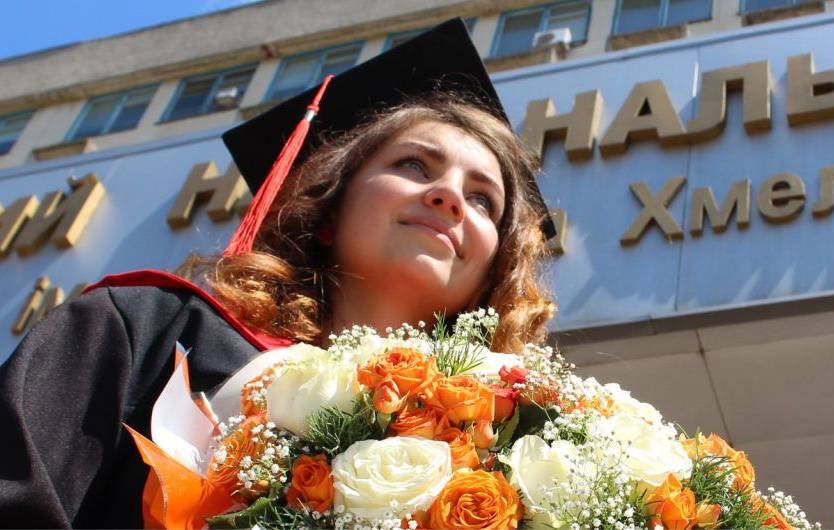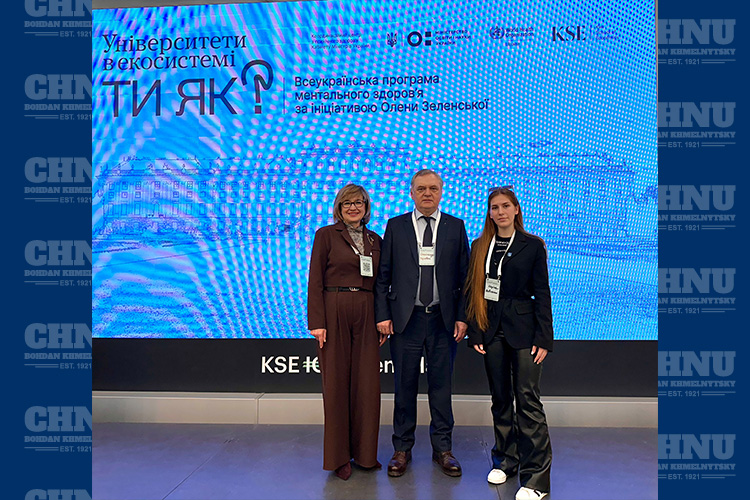The delegation of Bohdan Khmelnytsky National University of Cherkasy, led by Rector Oleksandr Cherevko, took part in a meeting focused on mental health.
The event brought together representatives of higher education institutions, which implement the All-Ukrainian programme “How Are You?”, including rectors, vice-rectors, and leaders of student self-government. The community consists of thirty HEIs, half of which train social work specialists, while nearly 90% prepare psychologists.
The First Lady of Ukraine, who is the initiator of the programme, joined the meeting participants. This was reported on the official website of the President of Ukraine.
“During my visits to foreign educational institutions, I always talk about Ukrainian education with joy and pride. In a country living through war, education is a manifestation of the fact that life goes on. It is a feeling that the future is possible and that it can hold something more than just war,” Olena Zelenska said.
Today, higher education institutions bring together up to a million students and around one hundred thousand faculty and research staff. More than thirty HEIs have had to relocate to other cities because of Russian aggression.
“A university becomes an enviroment where, like in a newly opened puzzle box, very different experiences are all mixed together. Those experiences can either clash, if we do not take care to foster healthy interaction, or they can help one another heal, becoming a place of strength and growth,” the First Lady emphasized.
In February, the “How Are You?” programme conducted a survey among faculty and students of 29 higher education institutions. The results revealed that nearly one in three faculty members showed signs of hidden burnout. 16% displayed burnout symptoms, which manifested themselves through emotional detachment, cynicism, and disillusionment. Another 18% reported a tendency to avoid work tasks, procrastinate, and lose motivation. And only 35% felt that they were able to cope with stress. A survey among students showed that about 52% required intervention of varying levels of intensity.
The meeting participants emphasized the importance of continuing to expand psychological support in higher education institutions. Psychological services are already functioning in 97% of institutions. A number of higher education institutions operate mental health centres, interactive spaces “Caring for Yourself”, youth centres, student development centres, coworking spaces, and also conduct psychological workshops, organize support groups, art therapy sessions, creative clubs, and more.
As part of the “How Are You?” initiative, large-scale training programmes are being conducted, in particular, 60 trainers of higher education institutions have been certified under the WHO’s “Self-Help Plus” programme, 52 higher education professionals have completed training at the Mental Health Academy, and 20 university advisors have mastered psychological first aid skills. Universities are also becoming platforms for exchanging experience.
“A university is not just about professional training. It is a space where mental health and psychosocial support services are provided, where the resilience is nurtured in both faculty and students. Self-care skills and mental health education should become integral parts of preparing professionals in any field,” Oksana Zbitnieva, Head of the Coordination Centre for Mental Health of the Cabinet of Ministers of Ukraine, noted.
Thousands of specialists are already being integrated into the mental health service delivery system, mastering foundational support skills, including family doctors, nurses, teachers, social workers, social educators, and career counselors.
Rector of BKNUC Oleksandr Cherevko noted:
“The All-Ukrainian mental health programme “How Are You?” brought together educators and scientists who are working on its implementation in the field of higher education. These are representatives of 30 universities from 20 regions of Ukraine. They already have practical results from implementing the mental health support programme. Ninety percent of them, including BKNUC, prepare specialists. In addition, they provide support to the educational process participants and to all those who need it, conduct trainings and educational sessions.
Bohdan Khmelnytsky National University of Cherkasy is among the most active, and this is the result of the work done by the Centre for Mental Health, established last year, as well as the efforts of the scientists, students, and graduates of the Faculty of Psychology of BKNUC.
Together with Vice-Rector for Educational and Image Activities Halyna Havryliuk, and Head of the Student Council Karina Vovchenko, we joined the event “The ‘How Are You?’ University Community: Rethinking Higher Education Through the Lens of Mental Health”, with the participation of First Lady of Ukraine Olena Zelenska, Head of the Coordination Centre for Mental Health of the Cabinet of Ministers of Ukraine Oksana Zbitnieva, Deputy Minister of Education and Science Andrii Vitrenko. We gained valuable experience, saw the results of research, and aligned our steps with like-minded people.”
According to Olena Zelenska, universities are becoming hubs of psychological safety, where the shared process of learning brings healing to all participants.
We are building a system of collective resilience to overcome all the challenges faced by Ukrainians.
http://cdu.edu.ua/en/news-en/olena-zelenska-ukrainian-higher-education-institutions-should-become-hubs-of-psychological-safety.html#sigProIdc91cb90ed2
The Official Website of the President of Ukraine
Press Office of Bohdan Khmelnytsky National University of Cherkasy













